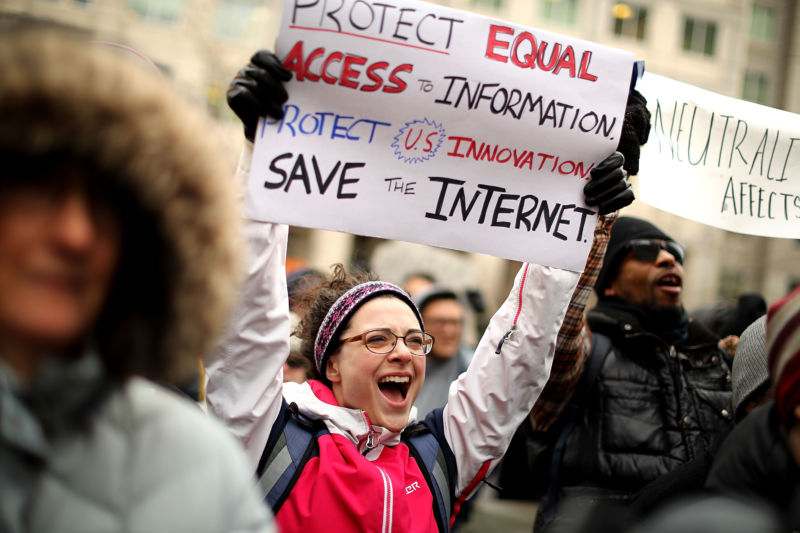
The Trump administration has asked the US Supreme Court to vacate the 2016 court ruling that upheld the Obama-era net neutrality rules in a strategy that could help uphold the Federal Communications Commission's recent repeal of those rules.
The rules themselves are no longer on the books, having been repealed by the FCC under Chairman Ajit Pai, Trump's pick to lead the commission. But broadband industry lobby groups appealed to the US Supreme Court in September 2017 anyway, asking the nation's highest court to rule that the Obama-era FCC exceeded its authority when it reclassified Internet providers in order to impose stricter regulations.
Lawyers for the FCC and Department of Justice filed a brief with the Supreme Court Friday, supporting the broadband industry's case. The DOJ and FCC noted that the case "appears to be moot" because of Pai's repeal of the net neutrality rules and that the future of net neutrality will be decided in a new case in which dozens of litigants sued Pai's FCC to reverse the repeal.
But instead of letting the 2016 US Court of Appeals for the District of Columbia Circuit ruling stand, the DOJ and FCC argued that it shouldn't act as a precedent during the current litigation over Pai's repeal.
FCC “repudiated” its previous ruling
"The court of appeals upheld the 2015 Order primarily because it concluded that it was required to defer to the FCC's legal and factual judgments," the DOJ and FCC wrote. "But the Commission itself has now repudiated those factual and legal judgments in a new order issued after full notice-and-comment proceedings."
The DOJ and FCC wrote:
In light of [the FCC's repeal of its own net neutrality rules], questions concerning the procedural and substantive validity of the 2015 Order lack continuing practical significance.
Instead, the legal questions concerning the proper regulatory treatment of broadband services will be resolved in the pending challenges to the 2018 Order. The Court therefore should grant the [broadband industry's] petitions, vacate the judgment below, and remand to the court of appeals with instructions to dismiss the petitions for review as moot. Alternatively, the Court could grant the petitions, vacate the judgment below, and remand to allow the court of appeals to consider in the first instance the effect of the 2018 Order on this litigation.
Even if the Supreme Court disagrees that the 2016 ruling is now moot, it should still vacate that ruling, the DOJ and FCC wrote.
"Alternatively, if this Court concludes that the 2018 Order did not render this case moot, or if it prefers not to resolve that issue, it should grant the [broadband industry's] petitions for writs of certiorari, vacate the judgment below, and remand for further proceedings to allow the court of appeals to consider in the first instance the effect of the 2018 Order on this litigation," the DOJ and FCC argued.
After the requested remand, the US Court of Appeals for the DC Circuit would have a few options, the DOJ and FCC wrote. "On remand, the court of appeals might determine that this case is moot," the agencies wrote. "Or it might conclude that the most appropriate course would be to hold this case in abeyance pending its resolution of the challenges to the 2018 Order. At a minimum, however, the 2018 Order constitutes a significant legal development that bears on the issues resolved by the court of appeals."
Trump admin request is “inappropriate”
The DOJ/FCC request for a "grant, vacate, and remand" is "not unexpected," but "is inappropriate in this case for a variety of reasons," John Bergmayer, senior counsel at consumer advocacy group Public Knowledge, told Ars. Bergmayer said that Public Knowledge will provide a full response to the DOJ/FCC argument in a future court filing.
The American Cable Association (ACA), one of the industry lobby groups seeking to overturn the pro-net neutrality court ruling, supported the DOJ/FCC argument in a statement to reporters.
"The government is making the right arguments in light of the FCC's old rules having been superseded," said ACA Senior VP of Government Affairs Ross Lieberman. "We hope the Supreme Court will grant the government's request."
In a related story, President Trump's Supreme Court nominee Brett Kavanaugh was the only judge to vote against the FCC in the 2016 federal appeals court case that upheld net neutrality rules. In his dissent, Kavanaugh argued that net neutrality rules violate the First Amendment rights of Internet service providers by preventing them from "exercising editorial control" over Internet content.
reader comments
145